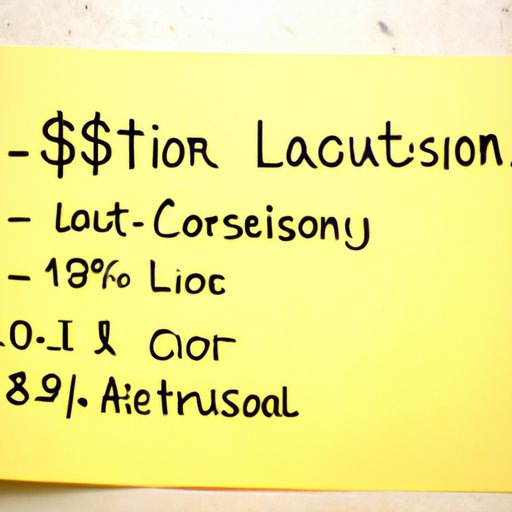Introduction
Lawyers are highly-trained professionals who provide legal advice and services to individuals and businesses. Becoming a lawyer involves completing many years of education and training, not to mention the cost of attending law school. In this article, we’ll explore how much does it cost to become a lawyer and examine some of the pros and cons of pursuing a legal career.

Cost Breakdown of Law School Tuition
In order to become a lawyer, you must complete a Juris Doctor (JD) degree program from an accredited law school. The cost of tuition varies widely depending on the type of law school you attend. According to the American Bar Association, the average cost of tuition for private law schools is $49,095 per year, while the average cost of tuition for public law schools is $27,291 per year.
In addition to tuition, there are other costs associated with attending law school such as books, room and board, and transportation. Depending on the law school you attend, these additional expenses can range anywhere from $7,000 to $25,000 per year.
Financial Aid Opportunities for Prospective Lawyers
Fortunately, there are a variety of financial aid opportunities available for prospective lawyers. Scholarships, grants, and student loans are all viable options for those looking to pay for law school. According to the U.S. Department of Education, nearly 70% of law students receive some form of financial aid.
Scholarships are typically awarded based on merit and may be offered through the law school itself or various organizations. Grants, which are similar to scholarships, are usually need-based and do not need to be repaid. Student loans are also available through the federal government and private lenders.
The True Cost of Becoming a Lawyer
The true cost of becoming a lawyer goes beyond just tuition and fees. According to a study conducted by the National Association for Law Placement, the average law school graduate incurs more than $50,000 in debt upon graduating. In addition to loan payments, lawyers must also consider the cost of taking and passing the bar exam, which is required in most states.
Furthermore, lawyers must factor in the cost of continuing their education. Many states require lawyers to take a certain number of Continuing Legal Education (CLE) courses every few years in order to maintain their license and stay abreast of changes in the law. These courses can cost hundreds or even thousands of dollars.

Budgeting Tips for Paying for Law School
For those considering law school, budgeting is key. Before applying to law school, prospective students should create a budget that includes tuition, living expenses, and any other costs associated with attending law school. Additionally, prospective students should research potential employers to determine what salary they could expect to earn upon graduation.
It is also important to compare the cost of attending different law schools. While private law schools may have higher tuition costs, they often offer better job prospects and networking opportunities than public law schools. Additionally, some law schools offer discounts for certain students, such as those who serve in the military or are members of certain minority groups.

How to Make Law School Affordable
There are several ways to make law school more affordable. Utilizing financial aid is one way to offset the cost of tuition. Scholarships, grants, and student loans can all help reduce the amount of money you need to pay out of pocket. Additionally, working during law school can help cover living expenses and other costs.
Making sacrifices during law school can also help keep costs down. For example, living at home or finding roommates to share an apartment can save money on rent and utilities. Furthermore, cutting back on entertainment and eating out can also help reduce expenses.
Exploring the Pros and Cons of Becoming a Lawyer
Before deciding whether or not to pursue a career in law, it is important to weigh the pros and cons. On the plus side, lawyers can enjoy a high salary and job security. According to the Bureau of Labor Statistics, the median annual wage for lawyers was $122,960 in 2019. Additionally, the demand for lawyers is expected to increase over the next decade.
On the downside, becoming a lawyer can be a stressful and time-consuming process. The workload of a lawyer can often be overwhelming, and the hours can be long. Additionally, lawyers are held to a high ethical standard and must adhere to strict rules and regulations.
Conclusion
Becoming a lawyer is a costly endeavor. From law school tuition to exam fees and additional expenses, the cost of attending law school can add up quickly. However, with careful budgeting and use of financial aid, law school can be made more affordable. Ultimately, it is important to consider the pros and cons of becoming a lawyer before making a decision.
(Note: Is this article not meeting your expectations? Do you have knowledge or insights to share? Unlock new opportunities and expand your reach by joining our authors team. Click Registration to join us and share your expertise with our readers.)
